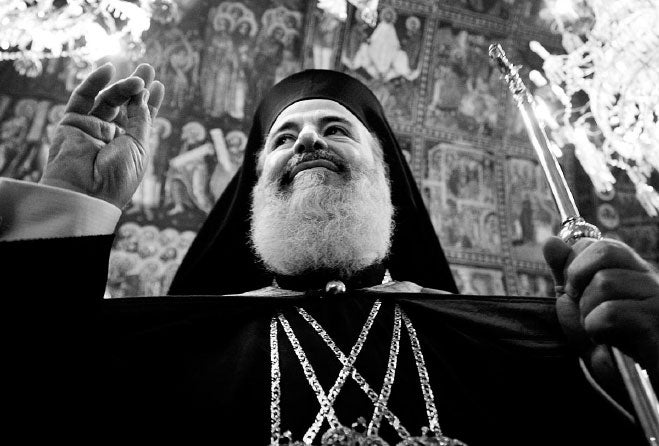Archbishop Christodoulos: Forthright Greek Orthodox leader

Elected in April 1998 as the youngest ever leader of Greece's national Church, Christodoulos burst onto the stage with vigour, soon earning the nickname "The Thunderbolt". Proclaiming to young people that "Orthodoxy is cool", he shot to the top of the Greek popularity stakes.
But the public was soon to get a taste of his forthright views. When Nato launched air attacks on Milosevic's Serbia in March 1999 to punish it for attempts to drive the ethnic Albanian population out of Kosovo, Christodoulos was shoulder to shoulder with his fellow Orthodox. "The Nato strikes are not only unchristian but a strike against Orthodoxy," he thundered. Of all Nato members, only Greece refused to participate in the bombing campaign. This was just the start of many public statements which left Christodoulos's supporters applauding, while critics fumed.
He was born Christos Paraskevaidis in 1939 into a devout Orthodox family, and his birthplace of Xanthi in Western Thrace would reinforce his view that Hellenism needed to be fought for. The town only became part of modern Greece in the wake of the First World War and has ethnic Turkish, Roma and Bulgarian residents. Mosques stand side by side with Orthodox churches.
Deciding early on to serve in the Church, he gained a diploma in Athens in 1961 before entering the Varlaam Monastery (built on a breathtaking hilltop as part of the Metéora monastic complex in central Greece), taking the name Christodoulos ("Slave of Christ"). Ordained a deacon that year, he was ordained priest in 1965, working for the next nine years in an Athens parish.
After gaining his theological doctorate in 1967, the multi-lingual Christodoulos also held the job of Chief Secretary of the Holy Synod, a key position at the heart of the leadership of the Greek Church. Despite subsequent denials that he knew anything about human rights violations under the Colonels' regime that ruled Greece from 1967 to 1974, Christodoulos was close to bishops who backed the junta. A photograph subsequently emerged showing his presence at the swearing-in of the regime's leaders.
Appointed Metropolitan of Dimitrias in July 1974 as the junta were being ousted, Christodoulos was an energetic diocesan bishop. From 1985 he also served as the Church's head of ecumenical relations.
After his election as primate, his bearded face became ubiquitous as he led campaign after campaign. Within the Church he challenged the traditional right of the Ecumenical Patriarch in Istanbul to name bishops for Greece's northern territories, leading to an embarrassing break in relations for three months in 2003. He vigorously defended Church figures accused of sexual or financial impropriety, both within Greece and in other Greek-dominated patriarchates, such as Jerusalem.
Christodoulos rejected attempts by successive political leaders to bow to pressure from Brussels to allow greater religious freedom and to end the dominance of the Greek Orthodox Church. He led a rousing campaign in 2000 to resist government plans to remove the "religion" category in identity cards, which religious minorities viewed as an easy way for officials to discriminate against them and against atheists. Christodoulos later claimed that the plan had been instigated by Jews.
In what he regarded as a further sign of the dangerous erosion of the influence of the Church, the New Democracy centre-right government in 2006 ended the right of Orthodox priests to go into schools to conduct confessions. Christodoulos waded in to oppose the move, to no avail. He also railed against history books which he believed did not go far enough in extolling the Church's role in preserving the Greek language and heritage under centuries of Ottoman rule.
Christodoulous constantly worried for the identity and Orthodoxy of Greece's youth, calling on them in 2002 to boycott the Greek Big Brother. He condemned globalisation as "a crime against humanity" and a vehicle for Americanisation of society. He condemned what he called the "deity of human rights" which he believed led to the undermining of the rights of his faith. He denounced Turks as "barbarians" and protested against any attempts to allow Turkey to join the European Union.
Yet Christodoulos showed himself open to contacts with the pope, despite widespread Orthodox views that the pope is a heretic. He did not oppose the government's invitation to Pope John Paul II in 2001 and – in the teeth of fierce criticism – agreed to meet him, though not for joint prayer. Christodoulos's return visit to the Vatican in 2006 to meet Pope Benedict was the first-ever by a Greek primate.
Felix Corley
Christos Paraskevaidis, priest: born Xanthi, Greece 21 October 1939; clothed a monk 1961, taking the name Christodoulos; ordained priest 1965; Metropolitan of Dimitrias 1974-98; Archbishop of Athens and All Greece 1998-2008, died Athens 28 January 2008.
Subscribe to Independent Premium to bookmark this article
Want to bookmark your favourite articles and stories to read or reference later? Start your Independent Premium subscription today.

Join our commenting forum
Join thought-provoking conversations, follow other Independent readers and see their replies